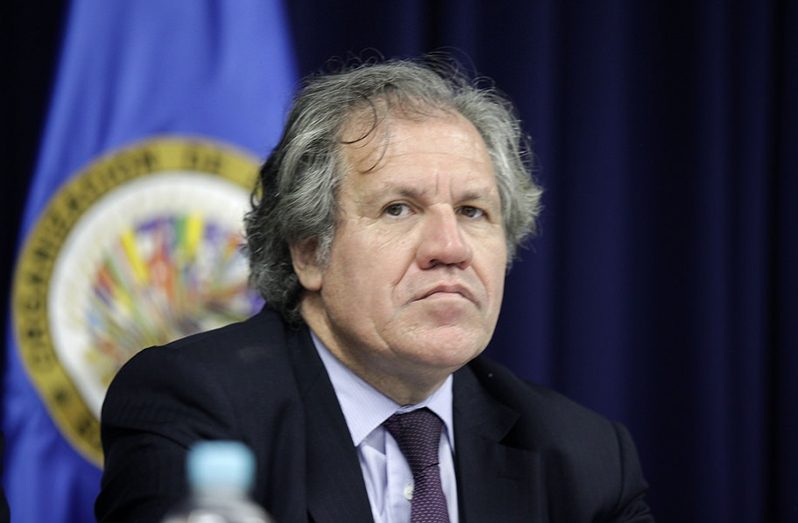amid Venezuela’s objections to oil auction, intimidatory tactics
IN response to recent objections raised by Venezuela regarding Guyana’s local oil auction, top international officials have voiced their support for Guyana’s sovereign right to develop its natural resources, and have rejected Venezuela’s intimidatory tactics.
Assistant Secretary of State for Western Hemisphere Affairs of the United States, Brian Nichols added his voice to the issue on Wednesday, calling for Guyana’s sovereignty to be respected, while dubbing any efforts to infringe on those rights as “unacceptable.
He stated, “The U.S. supports Guyana’s sovereign right to develop its own natural resources. Efforts to infringe upon Guyana’s sovereignty are unacceptable. We call on Venezuela to respect international law, including the 1899 arbitral award and the ongoing ICJ process between Guyana and Venezuela.”
Meanwhile, Secretary General of the Organization of American States (OAS), Luis Almagro, expressed his disapproval of attempts to undermine the principle of “good-neighbourliness”, and affirmed Guyana’s right to welcome investors.

He stated, “We [OAS] vehemently decry intimidatory tactics that seek to undermine the principle of “good-neighbourliness”. We recognise the right of Guyana to welcome investors. Guyana must preserve its territorial integrity & security by addressing its case with Venezuela at the ICJ (International Court of Justice).”
Tensions escalated when Venezuela issued a statement on Tuesday, challenging Guyana’s sovereignty by asserting that certain maritime areas did not fall under its sovereign rights. The statement warned that any actions within these areas, licensed by Guyana, would violate international law, unless agreed upon with Venezuela. It concluded with a threat to “apply all the necessary measures” to prevent operations licensed by Guyana in these waters, which Venezuela claims as its own.
In a statement, President Dr. Irfaan Ali responded firmly, stating that, “Guyana considers this a threat not only to Guyana but to regional and international peace and security, as well as to all of Guyana’s current and potential investment partners.” He added, “Guyana has no doubt that under international law, the waters in question form part of its Exclusive Economic Zone, where Guyana alone enjoys sovereign rights over the resources in the sea and beneath the seabed.”
Dr. Ali pointed out that if Venezuela disputes this, it is obliged by the United Nations Charter and the Charter of the OAS to employ only peaceful means to seek a resolution. Both charters prohibit the threat or use of force against another state.

He called on Venezuela to honour its obligation to pursue only peaceful means to settle any dispute with Guyana, including adjudication before the International Court of Justice (ICJ), where Guyana has sought confirmation of the land boundary between the two states.
“Allowing the Court to decide any other dispute between the parties would ensure a resolution that is peaceful, equitable and in accordance with international law,” the president said.
In April of this year, the world court ruled that the case Guyana brought before it seeking to affirm the validity of the 1899 Arbitral Award settling the boundaries between it and Venezuela was admissible.
This meant that the court could move forward with hearing the substantive case on its merits, of whether the 1899 arbitral award settling the boundaries of the two countries is valid and binding.
The ruling marked the second time that the international court has rejected jurisdictional objections raised by Venezuela.
Guyana moved to the ICJ with its case in March 2018, challenging the non-participating Bolivarian Republic of Venezuela over its disagreement on the legal validity and binding effect of the 1899 Award.
Venezuela maintained that the ICJ was without jurisdiction to hear the case and refused to participate in the court proceedings.
The Spanish-speaking country had claimed that it is the “sole indisputable inheritor” of the Essequibo region and the Monetary Gold Principle.
Although Venezuela had claimed that the ICJ did not have jurisdiction to hear the substantive case, the country made a U-turn following the court’s December 2020 ruling on that aspect of the case. Venezuela on that occasion contended that Guyana had no standing in the matter. The court unanimously rejected Venezuela’s objection.
Guyana is seeking a final and binding judgement that the 1899 Arbitral Award, which established the location of the land boundary between then British Guiana and Venezuela, remains valid and that the Essequibo region belongs to Guyana and not Venezuela.



.jpg)








